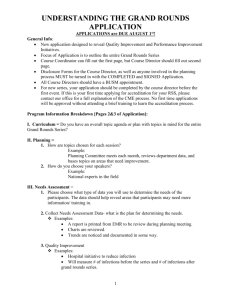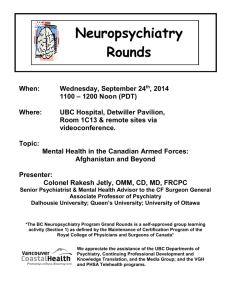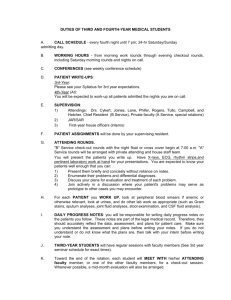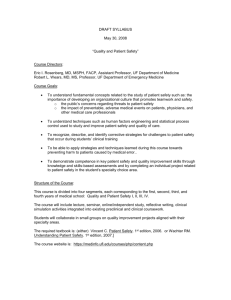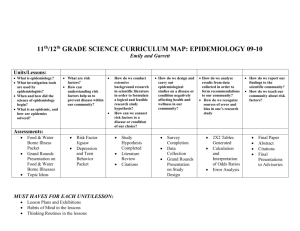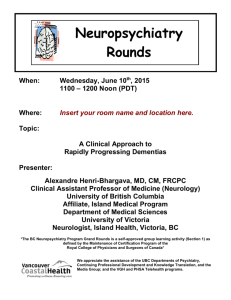Teaching Dossier Instruction Manual
advertisement
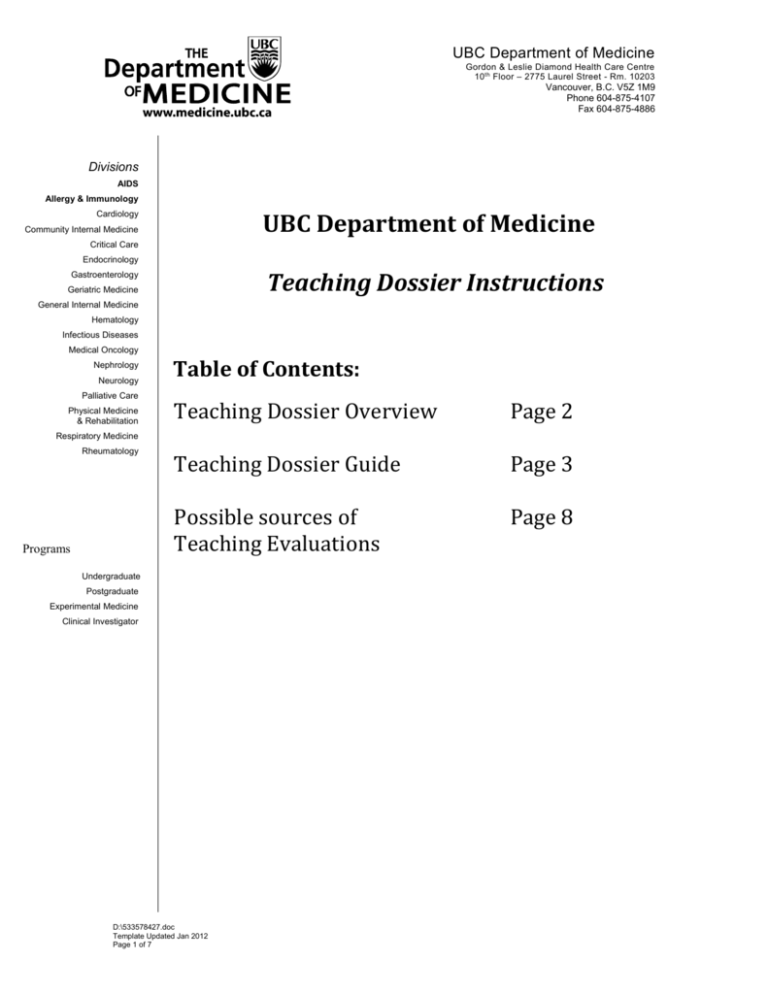
UBC Department of Medicine Gordon & Leslie Diamond Health Care Centre 10 th Floor – 2775 Laurel Street - Rm. 10203 Vancouver, B.C. V5Z 1M9 Phone 604-875-4107 Fax 604-875-4886 Divisions AIDS Allergy & Immunology UBC Department of Medicine Cardiology Community Internal Medicine Critical Care Endocrinology Teaching Dossier Instructions Gastroenterology Geriatric Medicine General Internal Medicine Hematology Infectious Diseases Medical Oncology Nephrology Neurology Palliative Care Physical Medicine & Rehabilitation Table of Contents: Teaching Dossier Overview Page 2 Teaching Dossier Guide Page 3 Possible sources of Teaching Evaluations Page 8 Respiratory Medicine Rheumatology Programs Undergraduate Postgraduate Experimental Medicine Clinical Investigator D:\533578427.doc Template Updated Jan 2012 Page 1 of 7 Teaching Dossier Overview The Teaching Dossier is an important component of the promotion/reappointment process. It allows the Department’s Academic Appointments, Reappointments, Promotion and Tenure (AARPT) Committee to see, at a glance, your contribution to the educational program(s) within the UBC Department of Medicine. It is meant to summarize your teaching accomplishments without replacing the teaching component of your CV. 1. Teaching Dossier This is where you provide the description of your teaching activities and responsibilities – the courses you taught, the lectures you’ve given, the students and/or residents you’ve supervised, etc. Please document all levels of your teaching (undergraduate, postgraduate, continuing professional development lectures/courses you have given, or teaching other health care professionals) and be as detailed as possible. 2. Teaching Evaluations Evaluations allow the AARPT committee to assess your teaching effectiveness. Ideally, we will have 3 or more evaluations for each area of your teaching. Evaluations must be appended to your Teaching Summary. a) Preferred sources for evaluations Collection of this information is much easier if done in a continuous manner rather than waiting until the time at which a promotion/review package needs to be put together. It is the responsibility of the reviewee to ensure that teaching evaluations are collected and aggregated for his/her teaching dossier. b) Supplemental evaluation request form We have provided a supplemental evaluation form you can use to obtain teaching evaluations from your peers and/or former students/residents/fellows, which will be forwarded on your behalf. Once you have completed your teaching dossier, please send it to your contact in the Department of Medicine Human Resources Team before the deadline you have been given. Queries on the preparation of the teaching dossier can be emailed to jane.zhang9@vch.ca . D:\533578427.doc Template Updated Jan 2012 Page 2 of 7 Teaching Dossier Guide Please find below examples of the types of teaching activities and information you may wish to include (as appropriate) within each section. These are examples only and do not represent a comprehensive list Scheduled Teaching: Scheduled teaching is defined as ‘didactic teaching’, teaching that is scheduled by the MD Undergraduate Program, Postgraduate Program and/or the UBC Department of Medicine. Undergraduate Year 1 Orientation DPAS (Doctor, Patient and Society) PBL: o Principles of Human Biology o HDI (Host Defenses & Infection) o Cardiovascular o Pulmonary o FERGU (Fluid Electrolytes & Renal & GU) Clinical Skills OSCE Examiner Year 2 DPAS (Doctor, Patient and Society) PBL: o GI o Blood & Lymphatics o Musculoskeletal & Locomotor o Endocrine & Metabolism o Integument o Brain & Behaviour o Reproduction o Growth & Development Clinical Skills (including 2nd year Bedside Teaching sessions) OSCE Examiner Year 3 Orientation Week Academic Half-Day (Sub-Specialty Specific) Bedside Clinical (Oral) Examiner Neurology Bedside Teaching OSCE Examiner Year 4 Preparation for Medical Practice OSCE Examiner Postgraduate D:\533578427.doc Template Updated Jan 2012 Page 3 of 7 Academic Half-Day – Core Internal Medicine Residents and/or Sub-Specialty Residents Journal Club Noon Rounds Seminar Series and/or Lecture(s) Unscheduled Teaching Unscheduled teaching is defined as ‘teaching combined with patient care’, teaching that occurs on a Clinical Teaching Unit (CTU), in a clinic office, and/or on a ward. Undergraduate & Postgraduate (to be separated in dossier) Clinical supervision and case review of 3 rd, 4th year and out-of-province undergraduate medical students , core internal medicine residents, sub-specialty residents, and fellows, while on service in/on the: CTU or other ward attending clinical role In-patient consult service Clinic Private office You can also include in this table project supervision and mentorship, including that of any summer or research students, and any ad hoc teaching contributed to the teaching of any program’s trainees where this is not already captured. MD/PhD Program Co-Supervisor of Respiratory Therapist’s Master’s Project Field Placement Supervisor for PhD student in Health Care and Epidemiology Member and Secondary Advisor, PhD Thesis Committee Member, Thesis Committee of two doctoral candidates GRADUATE STUDIES/EXPERIMENTAL MEDICINE Chair, Thesis Defense for MD/PhD student in Experimental Medicine, including report preparation Primary supervisor of graduate student, including experimental design, data and literature review, manuscript preparation – 7 hours/week Primary supervisor of Master of Science students: Committee Meetings – 10 hours/year; Teaching – 10 hours/year; Defence Committee – 5 hours/year Primary supervisor of Master's student in Experimental Medicine – 2 hours/month Principal Supervisor of Master’s in Health Sciences Candidate Project Sponsor of Master of Arts in Leadership and Training (MALT) Candidates – facilitating research and reviewing final paper OTHER HEALTH CARE PROFESSIONALS Annual lecture to UBC OT/PT program on osteoarthritis BC Cancer Program Radiation Therapists' Program - lecture on medical oncology with follow up email answers. BC Nephrology Days for nurses, dietitians, and social workers BCIT Cardiac Science technical students in pacemaker lab – ½ day clinical mentoring, 23/year BCIT ECG and Echocardiography technicians – ¼ hour/day of teaching, year round, as part of their practicum Clinical supervision, concurrent review: HIV clinic for dental residents - 60 hours/year CME for dialysis nurses D:\533578427.doc Template Updated Jan 2012 Page 4 of 7 CME for nurse practitioners – 2 days/month for 2 months Hypertension talks (e.g. Introduction to Blood Pressure) to nurses in CCU, ICU, CTU, etc. – 1 every 2 years ICU inservice training for respiratory therapists and ICU nurses Inservice Teaching – several hours/year Journal Club with Respiratory Therapists – 8 hours/year Lecture to Family Physicians on Nephrology topics Lecture to Nursing Laboratory Technicians – 2 hours/year Lecture to Respiratory Therapists – 2 hours/year Lectures on headache, UBC School of Nursing Lectures, BC GI Nurses’ Program Nursing students’ orientation to inpatient GI practice – 2-3 hours/month Office case-based in-service for physiotherapists – 1 hr/week, 48 weeks/year Presented at the 15th Annual Conference for the Canadian Association for Nurses in HIV Care Private Laboratory Technicians’ CME – 1 morning lecture/year Program Speaker, Science World Scientists and Innovators in Schools Talk on Liver Disease delivered to Nursing Staff and General Practitioners – 3 hours every 3 months Updates on GI topics for nursing staff MEDICAL ROUNDS Grand Rounds Department/Division-specific Grand Rounds (e.g. Department of Surgery Grand Rounds; Medical Oncology Grand Rounds, etc.) Local hospital Grand Rounds (e.g. Richmond Hospital Grand Rounds, Surrey Memorial Hospital Grand Rounds, Fort St. John Hospital Grand Rounds, etc.) St. Paul’s Grand Rounds VGH Grand Rounds Sub-specialty Rounds Note: These are division-specific rounds that you presented at. E.g.: AIDS Care Rounds Citywide rounds (e.g. City-Wide Endocrine Journal Club, Citywide Rheumatology rounds, etc.) Division-specific rounds (e.g. Rheumatology Rounds, Physical Medicine and Rehabilitation Rounds, etc.) Intracity Noon Rounds Journal Club Wednesday Hematology/BMT Noon Rounds CONTINUING MEDICAL EDUCATION Please give the number of CME presentations that you presented (not attended) per year. EDUCATIONAL PROGRAM &/OR CURRICULAR DEVELOPMENT & SUPPORT This is where you list any involvement you have in the development of education products, educational administration and service, etc. (e.g., involvement in case writing, local education committees, Program Directorships, Course Chairs etc – see guide for further details)\ Chair, weekly clinical case rounds D:\533578427.doc Template Updated Jan 2012 Page 5 of 7 Content Advisor in redevelopment of PBL angina case and associated components Contributor, Neurogenetics Talks (Series) for Neurology Postgraduate Training Program Director, Research Mentorship Program Director, Nephrology Residence Program Member, Education Committee for the Division Site Coordinator and Director of Postgraduate Training, Fraser Valley Cancer Centre Undergraduate Education Representative for the Division Week Chair, PBL Blood & Lymphatics Co-developed Nephrology component of 3rd Year Academic Half-Day curriculum Co-developed curriculum goals and objectives of Internal Medicine for CanMEDS Co-wrote a peer-reviewed paper on training medical residents in research that was published in Academic Medicine Developed a 15-module didactic curriculum for Clinical Associates in Medical Oncology Developed and invigilated Neurology OSCE Ethics Station Developed parallel research training program for Endocrine Fellows Developed Transplant Nephrology Training Program Initiated and organizes weekly inpatient service Journal Club Organized and administers Nuclear Cardiology city-wide rotations Participated in the Royal College of Physicians & Surgeons (RCPSC) review of the Medical Oncology training program in British Columbia NATIONAL EDUCATIONAL COMMITTEES Canadian Cardiovascular Society Primary Panel for Heart Failure and Cardiology Intervention Faculty advisor to national student committees Membership on the Royal College Examination Board National GI Committee RCPSC Physical Medicine & Rehabilitation Committee RCPSC Infectious Diseases Residency Training Committee Regional representative at national committees CONFERENCES ARRANGED Please list the conferences where you were a keynote speaker or had an administrative or organizational capacity. Possible roles: Organizer Director Coordinator Chair Co-chair Member of Administrative Committees (e.g. Advisory, abstract selection, peer-review, etc) Moderator Panel speaker Keynote speaker Course organizer TEACHING AWARDS AND/OR NOMINATIONS BC Innovations Awards in Educational Technology – Leadership Award presented by the BC Educational Technology User Group and BC Campus Donald M. Whitelaw Award for Most Outstanding Grand Rounds – Department of Medicine Duncan Murray Teaching Award, Division of Physical Medicine and Rehabilitation D:\533578427.doc Template Updated Jan 2012 Page 6 of 7 The Fay R. Dirks Award for Excellence in Teaching, St. Paul’s Hospital, Department of Medicine The Graeme Copland Clinician Teacher Award Hoffman-LaRoche Award – Outstanding faculty lecture – UBC Gastroenterology Academic Session Howard Stein Master Teaching Award, St. Paul’s Hospital Medical Oncology Residents’ Recognition of Teaching Most Outstanding Clinical Teacher, awarded by Medical Residents Shelley Naiman Award for Excellence in Clinical Teaching Teacher of the year Award, St. Paul’s Hospital Family Practice and Royal College Residents UBC Postgraduate Program in Cardiology Teaching Award for “Best Teacher during a clinical rotation” UBC Roche Oncology Award for “Excellent in Clinical Teaching Skills” D:\533578427.doc Template Updated Jan 2012 Page 7 of 7
